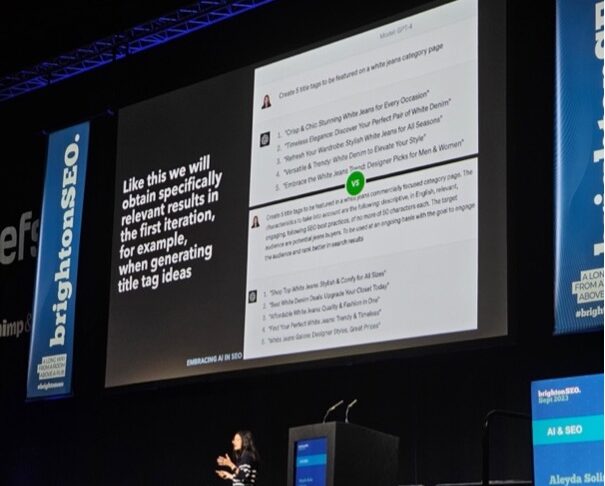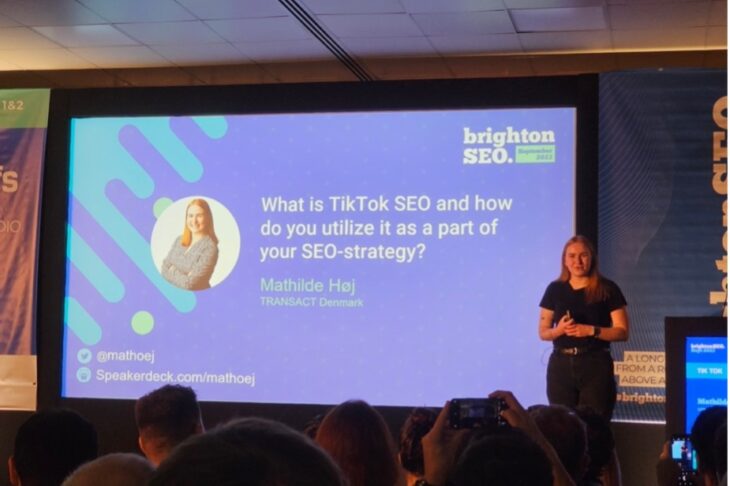- Digital Marketing
- Perspective
AI and TikTok are the present and future of SEO.
Lee Savery, Digital Content and SEO Manager has given us his thoughts on the state of all things Search Marketing, AI and how TikTok is always listening…

Standing on the pier in the blazing September sunshine, it felt like the last remnants of summer was hitting the south coast before the inevitable tide of Autumn. Looking into the horizon is always important in SEO with new updates and techniques always coming into view. Fortunately, this was also the beautiful setting for Brighton SEO’s biannual conference.

On the hottest of days, two of the hot topics that had the conference rooms full to the brim were talks about artificial intelligence and TikTok. Both have certainly hit the zeitgeist not only in digital marketing but also with the public.
I was also one of those most interested to see what other specialists were doing with AI and TikTok and below are my thoughts on what was shared.
The rise and rise of AI.
The photo above was taken the afternoon after finding out that Google had released a new Helpful Content update while every SEO in the world descended on the South Coast of England. Interestingly, John Mueller, Senior Search Analyst at Google and the man every SEO turns to for tips and tricks for rankings took part in a panel all about Google Updates. Except he neglected to mention that an update would be released a mere four hours later!
The new update reflected the state of SEO which was also seen with the swathe of talks about AI Content, AI & SEO and more. The update specifically changed the wording of the guidance from better ensuring people see “original content written by people, for people, in search results” to simply “original, helpful content created for people in search results.” Essentially, this was Google officially softening its stance on AI-generated content from sources such as ChatGPT and more.
Despite initial concerns from around the world – including from our copywriter, Steve – it seems Google recognises AI content is out there and it must act to ensure only the best is seen. The softening of this stance, however, does risk the chance of low-quality content taking up rankings very quickly.
It’s this mood that was reflected in the swathe of AI-related talks that took place at this conference. From using AI to help with your marketing strategy to creating content with AI. From AI and emotional intelligence to AI schema markup.
How to embrace AI in SEO.

The talks on AI that stood out most of all were those that discussed how AI can support day-to-day tasks to add more value to your clients. One such talk was Embracing AI in SEO by Aleyda Solis from ORAINTI.
In her talk, she addressed the wave of changes in SEO thanks to AI. This included how Google’s large language model generative AI search results – not available in the UK just yet – will answer user queries using ranked content. Recently it has started to cite its sources, giving websites another chance of gaining clicks. Then there’s the rise in the use of AI tools such as ChatGPT, Frase AI and others. So much so that publications, such as Gizmodo in Spain, have fired all their Spanish authors because AI can translate content for them.
While LLM tools have their place for supporting, summarising and generating content, answering questions and correcting spelling and grammar, the human aspect is missing. That is why AI is not great for creating content for marginalised groups, understanding current events and having emotional intelligence. However, from what we can see from Google’s softening stance on AI content, there’s a worry that the negatives won’t matter too much, at least initially until the algorithm learns what is good and bad.
With the world painted, the main aspect of her talk was all about how SEO can be advanced with the use of AI. This includes:
- Classifying URLs and performing analysis across a data set.
- Explaining technical problems to non-technical stakeholders.
- Using tools such as Similar.ai and MerchStack for e-commerce.
- Experimenting with AI to support content audits and analysis.
- Speeding up audits to improve efficiency and avoid manual errors.
- Researching and analysing competitors and content topic extraction.
- Report automation and highlighting the ROI of tasks.
- Identifying link-building opportunities and analysing backlink quality.
What was interesting about Aleyda’s talk was the breadth of tools available for SEO professionals and agencies to speed processes up. What I would say is that SEO was already ahead of the curve with numerous established tools already available – such as Ahrefs, Google Analytics and Looker Studio to name a few – that help with content ideation, data collection and creating reports.
However, what was apparent from the tools listed was the amount of work required by an SEO professional to get them to work. This continues to make agencies the only place companies can get real value for money for combined services and expertise. It also means SEO professionals aren’t in any danger of being replaced with artificial intelligence just yet!
TikTok and SEO.

It might seem an odd juxtaposition to be talking about TikTok and SEO in the same breath. Social media and websites are separate platforms, but every good integrated marketing strategy will create and schedule content to benefit both. This was the topic of the talk from Mathilde Høj of TRANSACT, Denmark.
TikTok exploded into the public consciousness during the Covid-19 pandemic. With people sitting around at home under lockdowns, finding short content from other grounded people suddenly became fascinating. So much so, that it currently has 1 billion users a day around the world. This has made it a prime channel for businesses and advertisers alike.
Mathilde highlighted that the platform has now become more than just a platform for people dancing in their bedrooms for the amusement of a Generation Z audience. The audience on TikTok is getting older and there is now content aimed at a wide range of ages.
Optimising for you.
The For You page is a unique driver of content pinpointing even the smallest of interests of a user and driving videos to them on this topic. How is this done? Much like search engines: algorithms. It looks at what its users are interacting with and then analyses the video information provided by creators to drive that traffic to users.
So, if you’re planning on creating content on TikTok – whether you’re a single user or a business – you need to use the platform like you would Google. Through keyword research, you can find topics people are searching for and create content tailored to them. These keywords should be used in on-screen text and text posts, and say them out loud in the video because “TikTok is always listening”.
You don’t even need a huge follower base to gain traction either, much like a new website can grow quickly with the right content and SEO fundamentals in place. If you do your research and create unique content for the platform, you can gain traction very easily.
Fortunately, Google also understands the importance of TikTok and has started indexing videos onto search engine results pages, making it another avenue for generating traffic to your website by posting videos on your sites.
Mathilde showed an example when Lidl went viral for having Mochi in their stores. The video helped see a 50% increase in searches for the keyword. However, Lidl was not prepared for their video to go viral. Their website wasn’t equipped for the extra traffic, no relevant landing page and Mochi was sold out in many of their stores.
There is a risk factor in going viral, however. If keywords you’re targeting gain an increase in searches, it’s not just your business that will benefit but also your competitors.
Ultimately, from a B2B perspective, there is still doubt as to whether TikTok is a viable option. The increase in the age of users and the breadth of business and advertising tools available to agencies and businesses however does mean it should be a channel that should be explored. If your audience is there, find your keywords, find your hashtags, and optimise your unique content for them.
If you’re looking for an agency to grow your SEO and digital marketing strategy, get in touch with the team by emailing hello@wyattinternational.com, or head to my LinkedIn to drop me an DM.